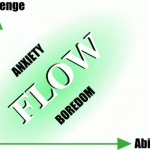Computers’ transformation of education is just beginning to gel.
[This was a piece I wrote for, potentially, the Intelligent Agent section in Wired. Since writing it I’ve learned a lot about what’s wrong with the sort of cyberphilia that permeates this article. Spot the elitist assumptions! Most of what I winsomely advocated at essay’s end is already underway, too… see my cyberspace discussion for examples.]
Personal computers were supposed to change our classrooms. The eighties hype: give a PC to every homeroom and watch students everywhere learn like mad! Now we know that was wrong–homeroom computers didn’t do much. The basic idea, though, was right: computers _will_change the ways we learn, permanently. It will just take longer than many thought.
Computers don’t themselves make education more interesting. Nothing can. Education will never be a killer app–you have to make an effort to learn, and passive entertainment will always be more popular. The payoff will come from making quality learning cheaper and quicker for those who want it.
What is quality learning? It’s having access to knowledge about what interests you, at a level you can understand, with counsel from someone to steer you, and with companions who learn with you. I call this guided depth: information in depth, with guidance (human guidance) when you need a boost or a clue. This creates learning, as the student charges ahead at their own speed in their own direction. We can measure our current systems in these terms.
First, stand-alone systems. CD-ROMs provide absorbable information in a convenient, coherent format, but they don’t hold very much (especially if you’re trying to learn a new subject from scratch), and they aren’t wired–you can’t work with someone on a CD-ROM, and you can’t download more when you’re done. Tutorial programs–drill programs–are useful mainly for rote learning, which is limited in scope. Software microworlds (SimCity et al) are perhaps the richest sort of learning tool yet created for individual PCs, since there’s no better way to understand something complex than by reliving it… but again, you’re on your own in the microworld.
Turning to networks, we find many more people but not much more learning. On Usenet, IRC, and most MUDs, you can talk to anyone but the system has amnesia: the only in-depth info (if you can call it that) is FAQ lists, and you can only learn so much from people in their spare time. The Web is stabler, yet it has no focus, no coherence–you can learn a lot if you’re lucky enough to find what you want, but there’s no structure, little guidance, and no real-time company. Other online networks are roughly comparable in how much (or how little) extensive, coherent information you can access, and in how little help there is for deep learning.
What we need is systems with the compelling presentation of good CD-ROM titles, the personal extensibility and wide spread of the Web, the real-time interaction of most MUDs, and (where appropriate) the engrossing power of complex simulated worlds. We need access to just about every topic, at every level of expertise.
To transform education, we must make teachers more productive, by helping them teach more people more knowledge in less time. With enough information online, students (of any age) can jump in where they choose and head in any direction, leveraging the online corpus. Teachers become more like local guides to the web. This is where the economic payoff lies: good pedagogy (self-motivated students learning autonomously) and better productivity go together.
None of this is radical news. Corporate education courses are probably on the furthest cutting edge of multimedia education: large companies are economically driven to teach their workers quickly and (relatively) inexpensively, and indeed, corporate educational systems are showing great cost-effectiveness. Higher education is also getting wired, with libraries uploading into networks, dormitories with network taps over each desk, lectures all videotaped, and seminars putting their sources on the Web. CD-ROMs are making their way into homes everywhere, working together with home-schooling memes to disconnect learning from the classroom.
Unfortunately, none of this is likely to shake down into public schools very soon: our centrally-administered public school system is much better at stifling change and innovation than at fostering it. But on the upside, there are plenty of low-tech measures which can invigorate our public schools without major high-tech investment–primarily, giving teachers and principals real control over how their schools are run, exploding bureaucracy wherever possible, and turning off the TV in favor of homework. (Amount of homework done is more important to scholastic success than any other factor except innate ability; if you do your homework you will do better, studies show, even if you’re not well off otherwise.)
As guided depth becomes cheaper, public schools will benefit along with all of us. In the next decade, high-tech will (for better or worse) do the most for higher education, where the money is. The rest of society will benefit at the speed of Moore’s Law making these tools universally accessible.
There is no silver bullet that will bring these systems magically alive. Our platforms are still expensive and in excessive flux; building guided depth into our computers will be a process of evolution, of building on what works now, to serve people here and now. For this reason, I suspect the Internet will remain the best infrastructure for these systems. There is plenty of payoff in catering to today’s students–you don’t need billions in new infrastructure to do this; you can let current audience demand pull the process. Content will emerge gradually, driven by student interest and system capability.
So what should we, five years from 2000, be doing? Melting boundaries between our systems! All CD-ROM authors, ask: if your title were on the web, how would you extend it–where would the links be? Soon, just about every informational CD-ROM should ship with a Web browser and a URL for the CD’s home page. (Microsoft, seeing this coming, already has online extensions for some of their Home titles.) Get on the web yourself–start feeling it out. Get students, if you know any, on the web. If you teach, start putting your source material online and start weaving your students’ work into it, and connecting it to other teachers’ work. If you write software authoring or content tools, ponder–how could this tool get wired? Web browsers should support real-time chat and time-based media. If you write games, make them multiuser–especially if they are simulations. And, of course, secure support for money, more bandwidth, and more powerful consumer hardware will all speed the emergence of universal guided depth.
This is not a distraction. This is the best possible near-term use of computers. What will make guided depth compelling is learning about what you want to know, in the company of real people to learn with and from. The killer-ness is emergent. As guided depth takes off, we could wind up engrossing a lot of people in a lot of learning. Isn’t that some hype worth working towards?








